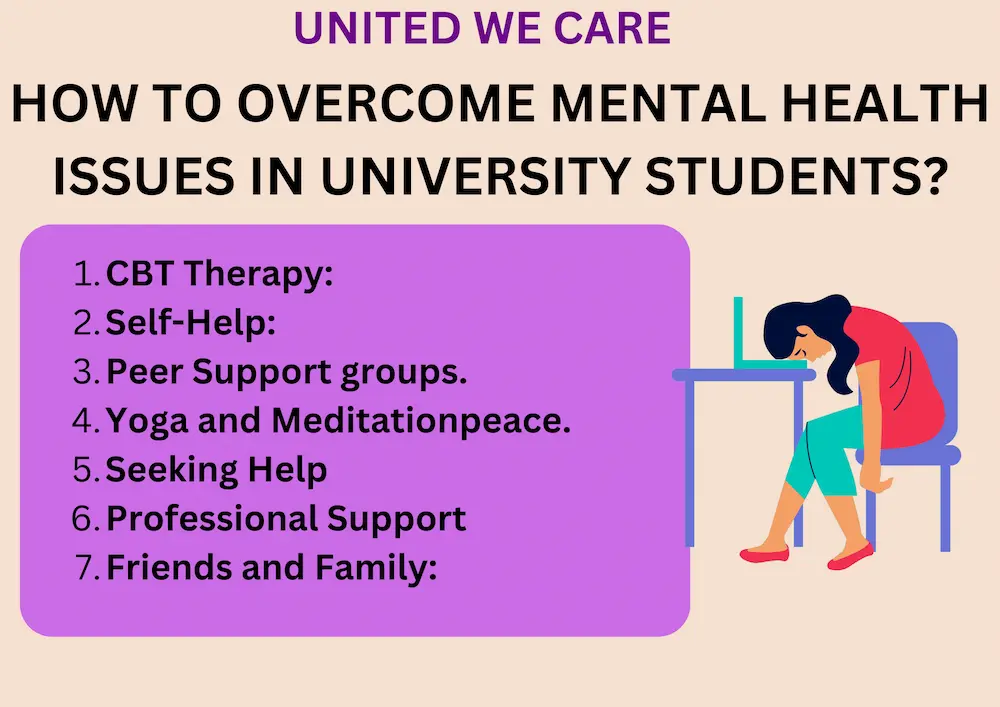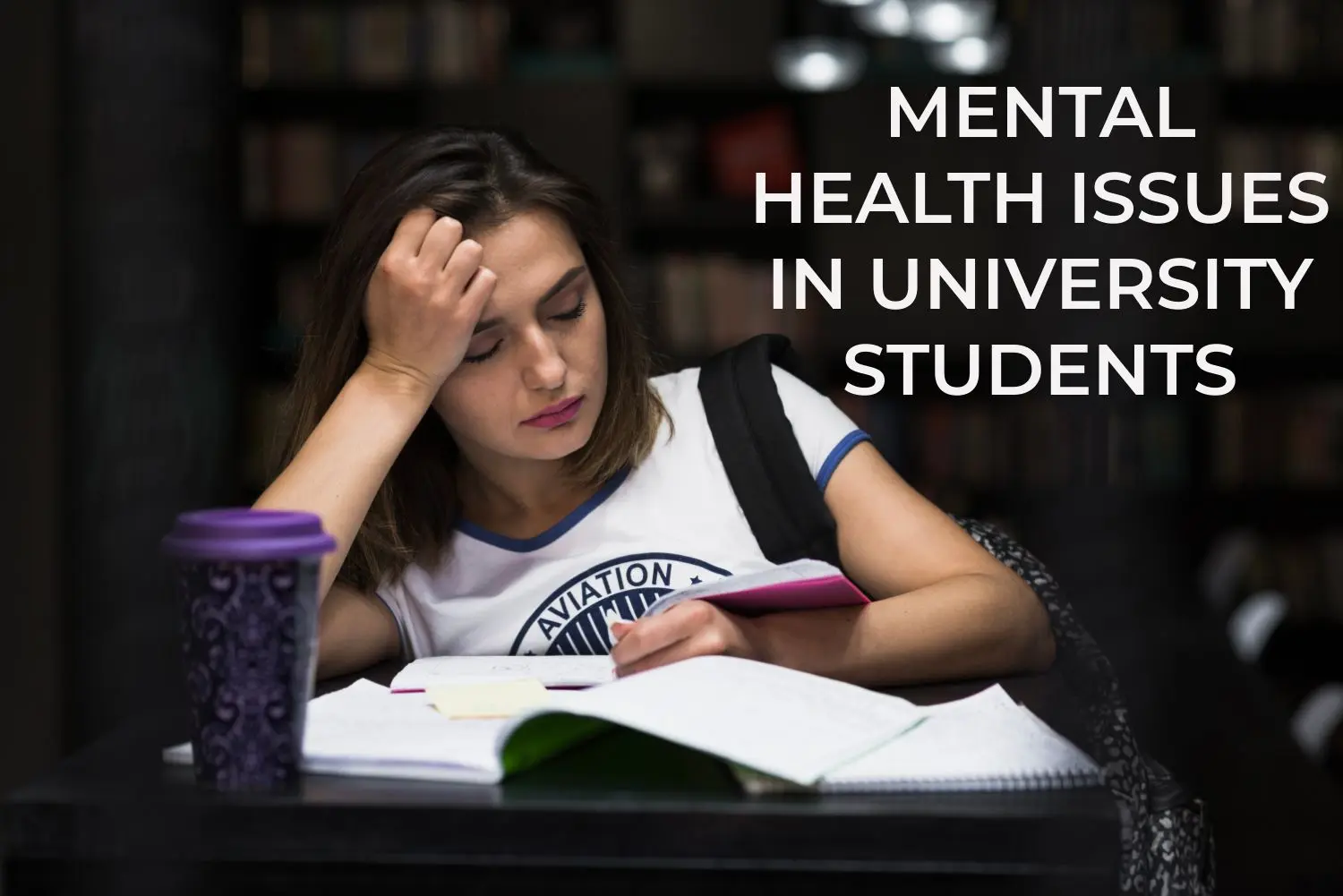Introduction
Mental well-being helps us to deal with everyday challenges effectively. University students face day-to-day challenges in terms of academics and career, relationships, financial loans, health, and wellness, which, if not taken care of well, can lead to mental health issues. This paper explores causes, impacts, and solutions for student mental health issues.
Why Is Mental Health In University Students Important?
Why is it important to discuss mental health among University students? Well, our minds help us learn, grow, and thrive. When weighed down by distress, it becomes hard to learn and progress in life.
- In fact, grades and focus slide as anxiety or depression clouds motivation, leads to social isolation, and may even cause some to drop out.
- Sadly, because of a lack of guidance about the solutions to their problems, some students turn to dangerous coping like substance abuse or self-harm.
- Strengthening mental health resources could allow students to blossom during demanding times.
- Given tools like stress management or counseling, they can better weather challenges.
- With the availability of wellness counseling services, students feel empowered to manage their day-to-day challenges.
- By providing the right kind of mental health and wellness solutions, we can cultivate the leaders of tomorrow.
What Are Mental Health Issues In University Students?
What are the mental health issues faced by university students?

- The mental health issues vary from anxiety to eating disorders, affecting thinking, emotions, or habits.
- These issues vary in severity and impact based on the person and their experiences. In fact, many factors influence mental health, spanning biological, psychological, social, environmental, and cultural realms.
- For students, certain factors elevate the risk of distress. Trauma or abuse in their past or present can leave painful scars.
- Discrimination for identities like LGBTQ or minority ethnicity also inflicts wounds. Juggling academic, financial, or personal pressures strains coping.
- Furthermore, loneliness from disconnection erodes wellbeing.
- Unrealistic expectations set some up for failure, and major life transitions during this developmental stage add turbulence.
But with compassion, we can curb the prevalence of student mental health issues. Supportive resources like counseling services for stress and burnout empower the youth, and social connections and feelings of belonging act as a buffer against isolation’s harm. By providing mental health resources, we can foster a campus climate where all students feel heard, accepted, and able to thrive.
Effects of Mental Health Issues in University Students
If left unchecked, mental health issues can ripple into every sphere of students’ lives. Academically, they face sliding grades and poor attendance and ultimately may choose to escape from pressures by dropping out of the university.
Socially, too, relationship struggles can lead to choosing isolation as a safer choice than facing judgment. Personally, self-doubt leads to low confidence and motivation.
Behaviorally, avoidance and withdrawal offer an outlet, however temporary. Some lash out, seeking release through aggression, and some take to substances or self-harm for relief.
Awareness of mental health issues in university students is the first step in the journey to support and guide the students towards coping skills.
How to Overcome Mental Health Issues in University Students?
Though mental health issues may seem unending, diverse treatments can light the way.
- CBT Therapy: Therapies like counseling or CBT build coping skills for the hard times.
- Self-Help: Self-help through apps and online resources lets students help themselves privately.
- Peer Support groups: Peer support groups replace isolation with belonging.
- Yoga and Meditation: Mindfulness, yoga, acupuncture – many nonspeech paths lead to peace.
- Seeking Help: Seeking help is not weakness but wisdom. It takes courage to acknowledge suffering and then redirect its course.
- Professional Support: With professional support, students can map out a treatment plan tailored to their needs. Campus services like the counseling center provide affordable help. Off-campus options like GPs or therapists offer alternate avenues.
- Friends and Family: Even trusted friends or family can lend an ear when darkness looms.
No matter the source, there are always nurturing hands ready to catch a student before they fall through the cracks. We all stumble sometimes on the path to realizing our potential. What matters most is having companions to break the fall, dust us off, and then walk with us into the light. Together, step by step, we can get through this.
Tips to Maintain Mental Health in University Students
- Caring for well-being helps students thrive even during hard times.
- Along with treating issues, nurturing mental health prevents future problems.
- Building healthy habits sets the tone for success.
- For physical health, eating nutritious foods, exercising, sleeping well, and avoiding alcohol and drugs create energy and focus.
- Emotionally, expressing feelings openly, seeking support when needed, managing stress through relaxation, and practicing gratitude lighten the spirit.
- Socially, making meaningful connections combats isolation. Joining clubs, volunteering in the community, and helping others fosters belonging.
- Academically, setting realistic goals, planning work in organized ways, getting feedback, and using available resources like tutoring prevents frustration.
- Personally, pursuing hobbies, identifying strengths, and exploring identity build self-knowledge and purpose.
By caring for all aspects of wellness – mind, body, emotions, relationships, and sense of meaning – students can flourish even in turbulent times. With balance across these areas, the daily burden feels lighter. Together, through patience, care, and community, we can cultivate lasting well-being.
Conclusion
Mental health issues are common and serious for college students, affecting all areas of life. When unwell, academics, relationships, confidence, and well-being decline. Multiple factors cause distress – from brain chemistry to trauma to social influences. This complex web requires compassion, not judgment.
Though mental health issues feel formidable, various treatments offer hope. Therapies build coping skills, while medication targets chemical roots. Self-help through online tools provides private aid. Peer support replaces isolation with care. Alternative approaches like meditation or yoga also heal holistically.
Alongside treatment, maintaining wellness is crucial. Physical self-care, like nutrition, exercise, and sleep boosts energy. Expressing emotions honestly, managing stress, and giving gratitude lighten heavy hearts. Building community and helping others through clubs or volunteering fosters purpose. Staying organized with studies prevents feeling overwhelmed. Exploring personal interests and strengths cultivates self-knowledge.
With care across all dimensions of wellbeing, students can thrive even during turbulent times. Prioritizing mental health unlocks human potential. Through empathy and support, we at United We Care can nourish our collective future leaders with our services because their growth is society’s growth.
References
- A. Danowitz, K. Beddoes, V. Mody, V. Mody, Y. Xia, Z. Lin, “A Snapshot of Mental Health and Wellness of Engineering Students Across the Western United States,” in IEEE Frontiers in Education Conference (FIE), 2020.
- M. Asghar, A. Minichiello, S. Ahmed, “Mental Health Monitoring System using Artificial Intelligence: A Review,” in IEEE 5th International Conference for Convergence in Technology (I2CT), 2019.
- K. M. Aldiabat, “College Students’ Mental Health Education System Based on Data Mining Technology,” in IEEE 4th International Conference on Information Science and Systems (ICISS), 2021.
- N. Matani, “The Effect of Mental Health on Academic Performance of Engineering Students,” in IEEE International Conference on Engineering, Technology and Innovation (ICE/ITMC), 2019.
- C. Le Navenec, “A Review of the Literature on Mental Health Issues in Higher Education: Implications for Educators and Administrators,” in IEEE International Conference on Teaching, Assessment, and Learning for Engineering (TALE), 2018.
- A. Teles, I. Rodrigues, D. Viana, F. Silva, L. Coutinho, M. Endler, R. A. Rabelo, “A Mobile Application for Mental Health Monitoring and Self-Management for College Students,” in IEEE 30th International Symposium on Computer-Based Medical Systems (CBMS), 2017.










